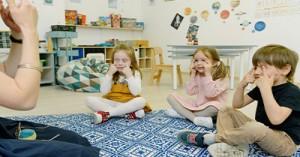When you've have accepted a job offer in service, it is fairly common that you will be put on a probation period. This is used to asses if you are suitable for the position and you meet the standards and expectation of your job responsibilities.
Once you have successfully completed your probation you will move into a permanent role.
Your employer decides on the length for new employees to start on probation, however typically when working in an early childhood service it's 4-6 weeks or longer.
What Is A Probation Period
Probation provides an opportunity for close supervision, monitoring and assessment of your work performance during the initial period of employment. The probationary period provides the first real opportunity to assess your demonstrated suitability for the job that you were selected for and for your ongoing employment.
Prior to the end of the probationary period, the Director will need to assess whether you should be made permanent or whether you will be terminated.
On successful completion of the probation period and review, you will receive a letter from the Director confirming your ongoing employment at the centre.
Casual Educators are exempt from a probationary period. This is because, by nature of the type of employment, casual are deemed terminated at the end of their last shift and cannot reasonably foresee an ongoing employment relationship.
Your Entitlements on Probation
While on probation, you will receive the same entitlements as an Educator who isn’t in a probation period. If you are hired on a full-time or part-time basis, you are entitled to accrue and access your paid leave entitlements such as annual leave and sick leave.
If you don't pass your probation, you are still entitled to receive notice when your employment ends and your unused accumulated annual leave hours paid out.
In regards to pay, it is fairly common that you will be paid at a lower level during your probation period. When you move onto into a permanent role then you will be put onto your current level. This needs to be discussed with the Director.
What To Do While On Probation
Just because you are on probation, it doesn't mean that you shouldn't work hard! This is a time to show that you are an asset to the service and you meet the expectations of your job role. You work as if you were working in a permanent role. For Educators working as a Room Leader, you can begin your documentation of planning the program, writing daily diaries, observing children etc. For Educators working as an Assistant, show initiative, engage with children, be helpful and supportive within the environment.
This is an opportunity for you as an Educator to demonstrate your abilities and to be put into a permanent position within the service.
Here are some other tips to consider:
- Dress appropriately – if your centre provides you with a uniform then lucky you! However if not please dress appropriately. Causal jeans/ track pants and a loose fitting top is the most comfortable to wear. You are working with children which also involves messy activities, painting and playing in the sand. Leave your good clothes at home. You can still look good in casual clothing.
- Chit chatter after work – women mostly work in childcare (we definitely need more men to balance it out) and as women, we tend to chat a lot. In childcare throughout the day, there is no time for chit chatter. I am not saying don't speak to any of your staff members but when you are looking after children please don't talk about what you did on the weekend...talk to the children.
- Bad language out – this is such a common mistake that all childcare workers do on occasions especially when we are having a very bad day. It is so important not to swear or say “bad words” in front of the children. If you accidentally swear, just try another word, quickly over the top, like sugar or shoe and don’t make it into a big deal.
- Don't take criticism personally – when we get criticized at work, sometimes we take it personally or hold grudges against others. We should take criticism with open minds and suggestions. If you are doing something wrong wouldn't you want to know about it rather than continuing to do it wrong? When we are working in a team environment we should be open to all thoughts, ideas and suggestions.
- Put on a happy face – if you had a fight with your parents or your boyfriend and you are angry, don't come to work and take it out on the kids. Try and leave your home life at home, even if you have to “put on a happy face”. Children can sense when you are angry and they won't make it any easier for you.I guarantee you in no time you will have a smile on your face when you see the kids faces.
- Be an efficient worker – there is a lot to get done during the day while working at a childcare centre so it's important to be efficient. If there are toys lying all around the floor then help the children clean it up. If there is paint on the table, wipe it up. Don't ignore it until someone else does it. There is no time for sitting down, you always have to move, move, move. Efficiency is also a good personal quality to have too.
- Common sense – After you have worked at your centre for about two months you should have good knowledge of what you are required to do on a day to day basis. It's important to use your common sense when working with children. Even if you haven’t been told what to do you could still use common sense when handling a situation or at least let the room leader know. We shouldn’t have to be reminded of the same thing over and over again, just remember it and do it.
- Stay safe and healthy – as you are working in direct contact with children it's very important to stay safe and healthy while working in childcare. If you are sick, it's best to take the day off, than to go into work feeling ill. You are no good to anyone if you are sick. There is a lot of lifting and bending in childcare so it's important to take care of your back and have the correct posture and lifting technique. With a back injury, you could be off work for months in total. There is also a lot of spilling and accidents that occur daily so remember to wipe/mop any spills so you don't trip and fall. Child care is a very demanding and sometimes stressful job which we need to stay healthy and safe for.
Termination During Probation
From time to time it becomes clear that you may not meet the requirements of the position and you may unlikely meet the requirements of the position within the probationary period. In this case, you will be terminated during your Probation Period. If you are terminated, you will be given the reason for your termination and
you may receive the following:
- the appropriate written notice (as contained in the employee’s contract) or payment in lieu of notice;
- payment of all accrued entitlements;
- a Separation Certificate (if you request it)
- a Certificate of Service (if you request it)
This concept of a “probation period" has long been accepted at common law and in industrial awards.
References:
Probation, Reference Number 2141, Fair Work Australia
Probationary Period, iHR Australia, 21 November 2013
Matthews, Daria "Probationary Periods Under Fair Work Act", Consult Australia







 As an Educator in Australia, your pay rate falls under the Children’s Services Award 2010. This award states the minimum amount that an employer can
As an Educator in Australia, your pay rate falls under the Children’s Services Award 2010. This award states the minimum amount that an employer can When working as a qualified Early Childhood Teacher (with a university degree) within a service, your rate of pay will come from the Educational Services
When working as a qualified Early Childhood Teacher (with a university degree) within a service, your rate of pay will come from the Educational Services When working as a Diploma Qualified Educator your pay rate is from the Children's Services Award 2010. This Award states your minimum rate of pay
When working as a Diploma Qualified Educator your pay rate is from the Children's Services Award 2010. This Award states your minimum rate of pay When working as a Cert 3 Qualified Educator, your pay rate is from the Children's Services Award 2010. This Award states your minimum rate of
When working as a Cert 3 Qualified Educator, your pay rate is from the Children's Services Award 2010. This Award states your minimum rate of Educational Leaders play a crucial role in their early childhood service by ensuring that the educational program aligns with best practices and supports the holistic
Educational Leaders play a crucial role in their early childhood service by ensuring that the educational program aligns with best practices and supports the holistic In early childhood education and care, ratios are more than a technicality—they are a frontline safeguard. Every child deserves responsive supervision, emotional connection, and developmental
In early childhood education and care, ratios are more than a technicality—they are a frontline safeguard. Every child deserves responsive supervision, emotional connection, and developmental Here’s a comprehensive Mobile Phone and Smart Watch Policy tailored for early childhood education and care (ECEC) services in Australia, aligned with the latest 2025
Here’s a comprehensive Mobile Phone and Smart Watch Policy tailored for early childhood education and care (ECEC) services in Australia, aligned with the latest 2025 With the new national child safety reforms kicking in on 1 September 2025, early childhood services like yours have a real opportunity to lead the
With the new national child safety reforms kicking in on 1 September 2025, early childhood services like yours have a real opportunity to lead the The Sea of Fish Challenge is a national initiative that invites children, educators, families, and communities to create and display fish artworks as a symbol
The Sea of Fish Challenge is a national initiative that invites children, educators, families, and communities to create and display fish artworks as a symbol Across the early childhood education and care sector, educators are sounding the alarm: current staffing ratios are insufficient to deliver safe, meaningful, and developmentally appropriate
Across the early childhood education and care sector, educators are sounding the alarm: current staffing ratios are insufficient to deliver safe, meaningful, and developmentally appropriate


